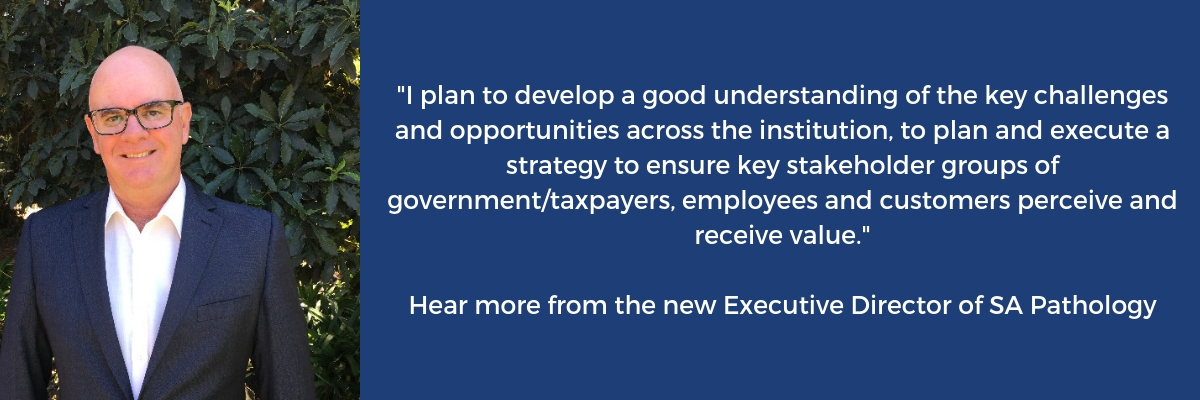Meet The New Executive Director of SA Pathology
21 Aug 2019

The new Executive Director of SA Pathology has a rare history and experience which spans 20+ years of senior leadership roles across 4 x iconic brand, ASX50, global best in class companies, and the last 3+ years as COO Melbourne TAFE network.
He has successfully worked across many industries, with centralised and decentralised organisation structures, often partnering with strongly industry experienced CEO’s. He is a trusted, strong, strategically and operationally capable partner with a record of successfully leading and managing key planning, execution, governance and change aspects across large complex organisations.
Liz Hlipala lead the search for SA Pathology which resulted in Mark being appointed. She spoke with Mark about his career.
You have extensive private sector experience. What benefits might that experience have for SA Pathology in your new role?
I have been fortunate to spend a large portion of my career working in executive roles for 4 x ASX50 companies, all of them being good at many things, and great and global best practice in some. These businesses have found a way to survive and thrive in highly competitive markets. I am fortunate to have had a large amount of on the job training, experience in what good and great looks like, and in how to implement it.
A combination of these factors enable me to diagnose where a public sector agency is sitting on the culture, capability, process and system spectrum and to plan and execute initiatives to move the organisation up on that spectrum.
How are leadership capacity and capabilities different between the public and private sectors?
Private sector has a major focus on performance and outcomes, and most stakeholders share the aligned purpose around shareholder value creation. If processes don’t support value creation, then they are changed. Cultures usually include concepts such continuous improvement, and clear accountability structures and processes.
Governance processes are often intentionally set at an appropriate and acceptable level, not absolutes. Calculated risk taking is often encouraged.
By contrast public sector requires more work around stakeholder engagement and alignment. I find the key stakeholder groups have a broader and sometimes misaligned set of priorities. It is important to understand these and influence these as much as possible toward an aligned set of priorities before initiating key strategies and initiatives.
Governance and processes can appear rigid and inflexible, this can work against an agency that needs to respond to changed and dynamic markets and circumstances. Challenging some of these norms is important in moving up the performance spectrum.
What attracted you to this role and what do you hope to achieve?
I was recruited from the private sector into Victorian Government 4 years ago to turn around an underperforming TAFE institution. It had been a monopoly service provider for 100 years and had not responded well to changing stakeholder requirements in recent years.
They wanted an experienced leader and business manager to diagnose the business problems and lead a response to changed circumstances, to articulate a vision, to lead its implementation, and ultimately to deliver stakeholder satisfaction and financial sustainability.
I think the SA Pathology business is in a similar situation with the exception that it is fortunate to have been given some time to improve its financial sustainability without the major distraction of de-contestability / privatisation occurring simultaneously.
I plan to develop a good understanding of the key challenges and opportunities across the institution, to plan and execute a strategy to ensure key stakeholder groups of government/taxpayers, employees and customers perceive and receive value.
How do you like to approach a new job?
When I can, I like to spend the first period listening to many stakeholders, visiting operating sites, questioning to ensure understanding, and reading as many key documents as I can. Whilst I believe the fundamentals of good business management are the same across most industries, it is very important to understand context and culture before leading and charting a path forward.
What is important to you in regard to values?
For me, values are important in developing culture. They provide an objective and depersonalised way for key stakeholders to challenge each other to improve, and to reinforce and recognise the behaviours necessary for success and improvement.
What are for you the four most critical aspects of leadership?
- Adjust style to circumstance and individual
- Develop a culture of high performance and continuous improvement
- Achieve engagement, empowerment and alignment across organisation
- Recognition of progress and achievement.
What is the piece of change management work that you are most proud of? Why?
Leading the financial turnaround of TAFE Melbourne through implementing a high-performance culture, improving capability, process and systems, and improving the entities ability to plan and execute.
It gives me fulfilment and satisfaction to leave an entity in great shape to face future challenges.

